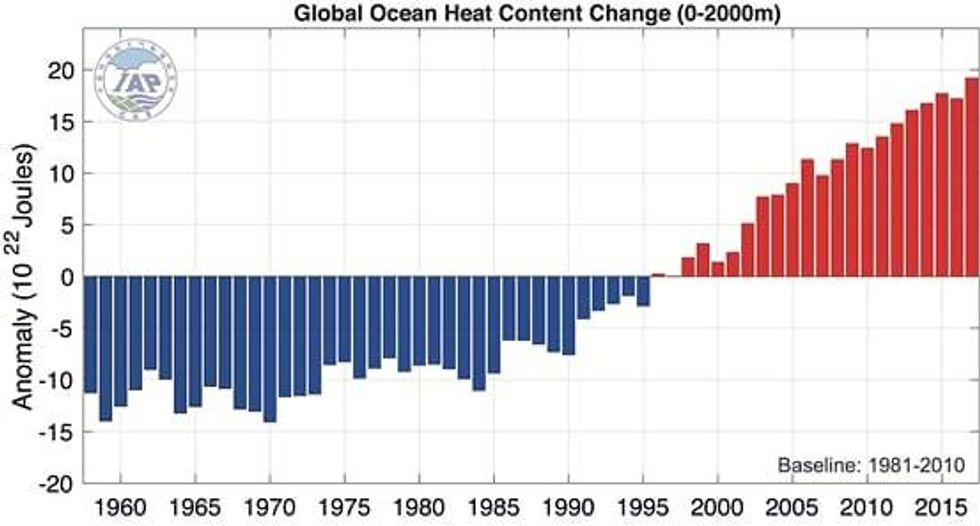A new analysis conducted by Chinese researchers and published in a peer-reviewed journal on Friday found that 2017 was the hottest year on record for the world's oceans, renewing concerns among those in the scientific community about the man-made climate crisis.
"The long-term warming trend driven by human activities continued unabated," the researchers, Lijing Cheng and Jiang Zhu, wrote (pdf) in Advances in Atmospheric Sciences. "The high ocean temperatures in recent years have occurred as greenhouse gas levels in the atmosphere have also risen, reaching record highs in 2017."
While measuring atmospheric temperature changes provides insight into humankind's impact on the planet--and recent reports show 2017 was the second-hottest year on record--"in terms of understanding how fast the Earth is warming, the key is the oceans," because almost all the planet's heat is stored in the seas, as John Abraham, a professor of thermal sciences, explains in a piece for the Guardian.
Abraham says last year's dramatic increase made 2017 "by far" the hottest year on record for the world's oceans.
Breaking down the significance of a graph presented in the new report, Abraham writes: "This graph shows ocean heat as an 'anomaly,' which means a change from their baseline of 1981-2010. Columns in blue are cooler than the 1981-2010 period, while columns in red are warmer than that period. The best way to interpret this graph is to notice the steady rise in ocean heat over this long time period."
"The fact that 2017 was the oceans' hottest year doesn't prove humans are warming the planet," he continues, acknowledging that small temperature fluctuations from year to year are normal, due to natural events like the Pacific Ocean's El Nino/La Nina cycle. "But, the long-term upward trend that extends back many decades does prove global warming."
"The consequences of this year-after-year-after-year warming have real impacts on humans. Fortunately, we know why the oceans are warming (because of human greenhouse gases), and we can do something about it."
--John Abraham, thermal sciences professor
"The human greenhouse gas footprint continues to impact the Earth system," the Chinese researchers note, and the consequences include not only sea level rise, but also "declining ocean oxygen, bleaching of coral reefs, and melting sea ice and ice shelves."
"The consequences of this year-after-year-after-year warming have real impacts on humans," Abraham writes.
"Fortunately, we know why the oceans are warming (because of human greenhouse gases), and we can do something about it," he concludes. "We can take action to reduce the heating of our planet by using energy more wisely and increasing the use of clean and renewable energy (like wind and solar power)."



